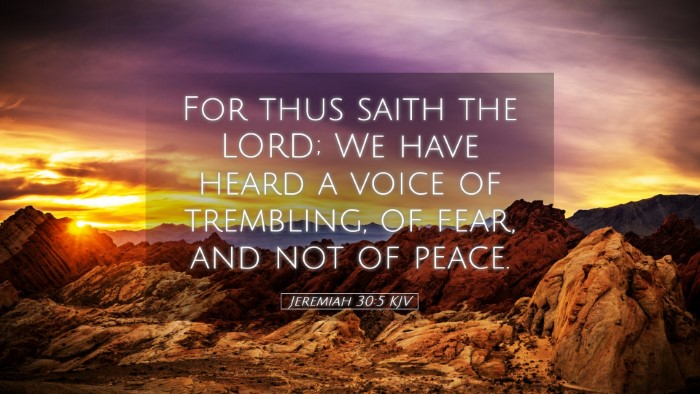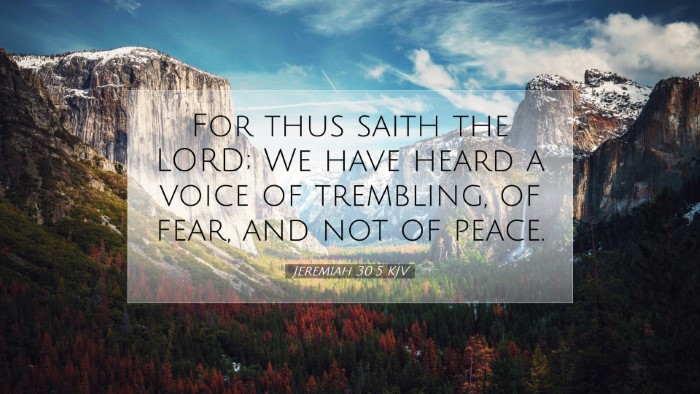Commentary on Jeremiah 30:5
Verse Context: Jeremiah 30:5 states, "For thus saith the LORD; We have heard a voice of trembling, of fear, and not of peace." This verse is significant as it illustrates the tumultuous condition of the people of Israel during a time of great distress and impending judgment. This commentary aims to delve into the insights drawn from various public domain sources to provide a comprehensive understanding of this verse.
Historical Context
In the context of the Book of Jeremiah, the prophet pronounces not only judgment but also hope for restoration. The historical backdrop includes the Babylonian exile where the people of Judah faced profound despair. Matthew Henry emphasizes that the trembling voice signifies their fear and anxiety at the prospect of the impending calamity.
Understanding the Voice of Trembling
This 'voice of trembling' can be interpreted both literally and metaphorically. Albert Barnes notes that it conveys the idea of a nation in distress, unable to find peace in their current circumstances. The sound reflects their inner turmoil and the seriousness of their sin leading to their condition. This notion resonates with many modern believers who experience inner conflict as they reckon with personal and societal sins.
Elements of Fear and Peace
The contrast of fear and peace is significant. Adam Clarke points out that although the people are gripped by fear, there is still a glimmer of hope as God speaks of future peace. This duality serves as a reminder that while judgment is just, God's ultimate plan includes reconciliation and peace. Scholars can appreciate this tension within the text as it invites deeper theological reflection on sin and redemption.
Theological Implications
The theological ramifications of this verse are profound. It serves as a reminder of the nature of God’s justice and mercy. Matthew Henry expounds that God’s first declaration of judgment serves to awaken the hearts of His people to the reality of their sin, much like the fear of God should do in the lives of believers today. Understanding God's perspective on sin brings clarity to the necessity of repentance and the hope for restoration.
Application for Pastors and Theologians
For pastors, the challenge lies in communicating the reality of divine judgment alongside the promise of peace and restoration. This verse can serve as a case study in preaching, demonstrating how to engage a congregation that may fear the repercussions of sin while offering them the assurance of God’s grace. The dichotomy seen in Jeremiah 30:5 provides a framework for discussions on both the weight of sin and the breadth of God's mercy.
Rhetorical Devices and Structure
From a literary perspective, the use of contrasting phrases in Jeremiah 30:5 enhances the emotional weight of the text. By juxtaposing 'trembling' with 'peace', the prophet draws attention to the gravity of the situation while simultaneously hinting at the transformative power of God’s word. This structural technique can enrich sermon preparation by illustrating how language can powerfully evoke response.
Conclusion
In summary, Jeremiah 30:5 encapsulates the tension between divine judgment and the hope of restoration. This commentary underscores the importance of understanding both the historical and theological contexts of the text for a more profound application within contemporary ministry. As the church today seeks to address fears and anxieties similar to those faced by Israel, it must hold firmly to the promise of peace that comes through genuine repentance and faith in God.


